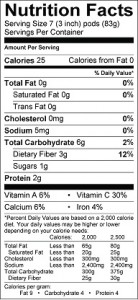Okra

Okra comes from a large vegetable plant thought to be of African origin, and it was brought to the United States three centuries ago by African slaves. The word, derived from the West African nkruma, was in use by the late 1700s. Grown in tropical and warm temperate climates, it is in the same plant family as hibiscus and cotton.
Okra is usually available fresh year-round in the South, and from May to October in many other areas. You can also find okra frozen, pickled, and canned, and in some regions you might find frozen breaded okra for deep frying. When buying fresh okra, look for young pods free of bruises, tender but not soft, and no more than 4 inches long. Okra may be stored in the refrigerator in a paper bag or wrapped in a paper towel in a perforated plastic bag for 2 to 3 days, or it may be frozen for up to 12 months after blanching whole for 2 minutes. Cooked okra can be stored (tightly covered) in the refrigerator for 3 to 4 days.
When cut, okra releases a sticky substance with thickening properties, often used in soups and stews. Gumbos, Brunswick stew, and pilaus are some well-known dishes which frequently use okra.
Okra can be served raw, marinated in salads or cooked on its own, and goes well with tomatoes, onions, corn, peppers, and eggplant. Whole, fresh okra pods also make excellent pickles. Its mild flavor can be compared to eggplant, though the texture is somewhat unusual.
Sourced: http://southernfood.about.com/library/weekly/aa081401a.htm
Storage
Fresh okra should be used the same day that it was purchased or stored in a paper bag in the warmest part of the refrigerator for 2-3 days. Severe cold temperatures will speed up okra decay. Do not wash the okra pods until ready to use, or it will become slimy.
Gumbo is Swahili for okra. The recent upsurge in the popularity of gumbo has also brought renewed attention to okra. Okra was brought to the new world by African slaves during the slave trade.
The pods must be harvested when they are very young. Preferably two inches long although three inch pods can also be salvaged. Harvest daily as the pods go quickly from tender to tough with increased size.
Refrigerate unwashed, dry okra pods in the vegetable crisper, loosely wrapped in perforated plastic bags. Wet pods will quickly mold and become slimy. Okra will keep for only two or three days. When the ridges and tips of the pod start to turn dark, use it or lose it. Once it starts to darken, okra will quickly deteriorate.
Preparation & Cooking Tips
When preparing, remember that the more it is cut, the slimier it will become. Its various uses allow for okra to be added to many different recipes. Okra is commonly used as a thickening agent in soups and stews because of its sticky core. However, okra may also be steamed, boiled, pickled, sautèed, or stir-fried whole. Okra is a sensitive vegetable and should not be cooked in pans made of iron, copper or brass since the chemical properties turns okra black.
Most people who have eaten or have cooked okra, know about the okra slime. There are few ways to minimize the slime:
- Simply trim the off the ends and avoid puncturing the okra capsule.
- You can also minimize the slime factor by avoiding the tendency to overcook okra.
Okra exudes a unique mucilaginous juice which is responsible for its thickening power in the famous Louisiana Creole gumbo dish. Aside from gumbo, okra compliments tomatoes, onions and corn, shellfish and fish stock. Okra has a subtle taste, similar to the flavor of eggplant.
Nutrition
The following nutrition information is for 7, 3 inch long okra pods (83 grams):
Source of Information: Fruitsandveggiesmorematters.org
Okra is a powerhouse of valuable nutrients. Nearly half of which is soluble fiber in the form of gums and pectins. Soluble fiber helps to lower serum cholesterol, reducing the risk of heart disease. The other half is insoluble fiber which helps to keep the intestinal tract healthy decreasing the risk of some forms of cancer, especially colorectal cancer. Nearly 10% of the recommended levels of vitamin B6 and folic acid are also present in a half cup of cooked okra.
Nutrition Facts (1/2 cup sliced, cooked okra)
Calories 25
Dietary Fiber 2 grams
Protein 1.52 grams
Carbohydrates 5.76 grams
Vitamin A 460 IU
Vitamin C 13.04 mg
Folic acid 36.5 micrograms
Calcium 50.4 mg
Iron 0.4 mg
Potassium 256.6 mg
Magnesium 46 mg

